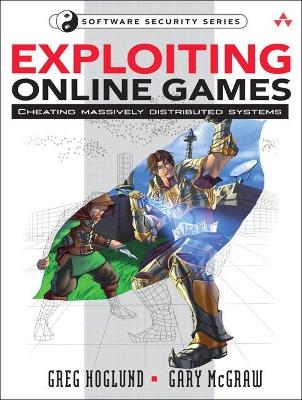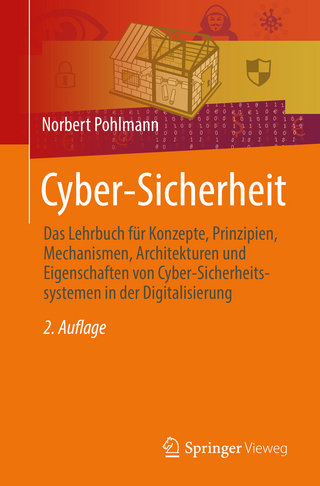
Exploiting Online Games
Addison Wesley (Verlag)
978-0-13-227191-2 (ISBN)
- Keine Verlagsinformationen verfügbar
- Artikel merken
Greg Hoglund has been involved with software security for many years, specializing in Windows rootkits and vulnerability exploitation. He founded the website www.rootkit.com, and has coauthored several books on software security (Exploiting Software: How to Break Code and Rootkits: Subverting the Windows Kernel, both from Addison-Wesley). Greg is a long-time game hacker and spends much of his free time reverse engineering and tooling exploits for new games. Professionally, Greg offers in-depth training on rootkit development and software exploits. He is currently CEO of HBGary, Inc. (www.hbgary.com), building a world-class product for software reverse engineering and digital forensics. Gary McGraw is the CTO of Cigital, Inc., a software security and quality consulting firm with headquarters in the Washington, D.C., area. He is a globally recognized authority on software security and the author of six best-selling books on this topic. The latest, Software Security: Building Security In, was released in 2006. His other titles include Java Security (Wiley), Building Secure Software (Addison-Wesley), and Exploiting Software (Addison-Wesley). He is the editor of the Addison-Wesley Software Security Series. Dr. McGraw has also written more than 90 peer-reviewed scientific publications, writes a monthly security column for darkreading.com, and is frequently quoted in the press. Besides serving as a strategic counselor for top business and IT executives, Gary is on the advisory boards of Fortify Software and Raven White. His dual Ph.D. is in cognitive science and computer science from Indiana University where he serves on the Dean's Advisory Council for the School of Informatics. Gary is an IEEE Computer Society Board of Governors member and produces the monthly Silver Bullet Security Podcast for IEEE Security & Privacy magazine.
Foreword xvii
Preface xxi
Why Are We Doing This? xxii
Where Do We Draw the Line? xxiii
What's in the Book? xxiv
The Software Security Series xxvi
Contacting the Authors xxvii
Acknowledgments xxix
Greg's Acknowledgments xxix
Gary's Acknowledgments xxix
About the Authors xxxiii Chapter 1: Why Games? 3
Online Games Worldwide 5
The Lure of Cheating in MMORPGs 7
Games Are Software, Too 9
Hacking Games 12
The Big Lesson: Software as Achilles' Heel 17
Chapter 2: Game Hacking 101 19
Defeating Piracy by Going Online 20
Or Not . . . 20
Tricks and Techniques for Cheating 21
The Bot Parade 31
Lurking (Data Siphoning) 36
Tooling Up 39
Countermeasures 46
Chapter 3: Money 65
How Game Companies Make Money 65
Virtual Worlds: Game Economics and Economies 67
Criminal Activity 73
Chapter 4: Enter the Lawyers 75
Legality 75
Fair Use and Copyright Law 77
The Digital Millennium Copyright Act 78
The End User License Agreement 79
The Terms of Use 88
Stealing Software versus Game Hacking 89
Chapter 5: Infested with Bugs 93
Time and State Bugs in Games 95
Pathing Bugs in Games 104
Altering the User Interface 107
Modifying Client-Side Game Data 108
Monitoring Drops and Respawns 109
Just Show Up 111
And in Conclusion 111
Chapter 6: Hacking Game Clients 113
Malicious Software Testing (Enter the Attacker) 113
Countermeasures against Reverse Engineering 122
Data, Data, Everywhere 126
Getting All Around the Game 132
Going Over the Game: Controlling the User Interface 132
Getting In the Game: Manipulating Game Objects 139
Getting Under the Game: Manipulating Rendering Information 164
Standing Way Outside the Game: Manipulating Network Packets 179
The Ultimate in Stealth: Taking Client Manipulation to the Kernel 180
Clients Make Great Targets 183
Chapter 7: Building a Bot 185
Bot Design Fundamentals 186
Bot as Debugger 208
The Wowzer Botting Engine 224
Advanced Bot Topics 228
Bots for Everyone 244
Chapter 8: Reversing 247
Taking Games Apart 248
Code Patterns in Assembly 264
Self-Modifying Code and Packing 290
Reversing Concluded 291
Chapter 9: Advanced Game Hacking Fu 293
Conversions and Modding 293
Media File Formats 314
Emulation Servers (Private Servers) 315
Legal Tangles 319
Chapter 10: Software Security Über Alles 321
Building Security In for Game Developers 322
Security for Everyday Gamers 327
Exploiting Online Games 328
Index 331
| Erscheint lt. Verlag | 19.7.2007 |
|---|---|
| Reihe/Serie | Addison-Wesley Software Security Series |
| Verlagsort | Boston |
| Sprache | englisch |
| Maße | 179 x 234 mm |
| Gewicht | 740 g |
| Themenwelt | Informatik ► Netzwerke ► Sicherheit / Firewall |
| Informatik ► Weitere Themen ► Computerspiele | |
| ISBN-10 | 0-13-227191-5 / 0132271915 |
| ISBN-13 | 978-0-13-227191-2 / 9780132271912 |
| Zustand | Neuware |
| Haben Sie eine Frage zum Produkt? |
aus dem Bereich


